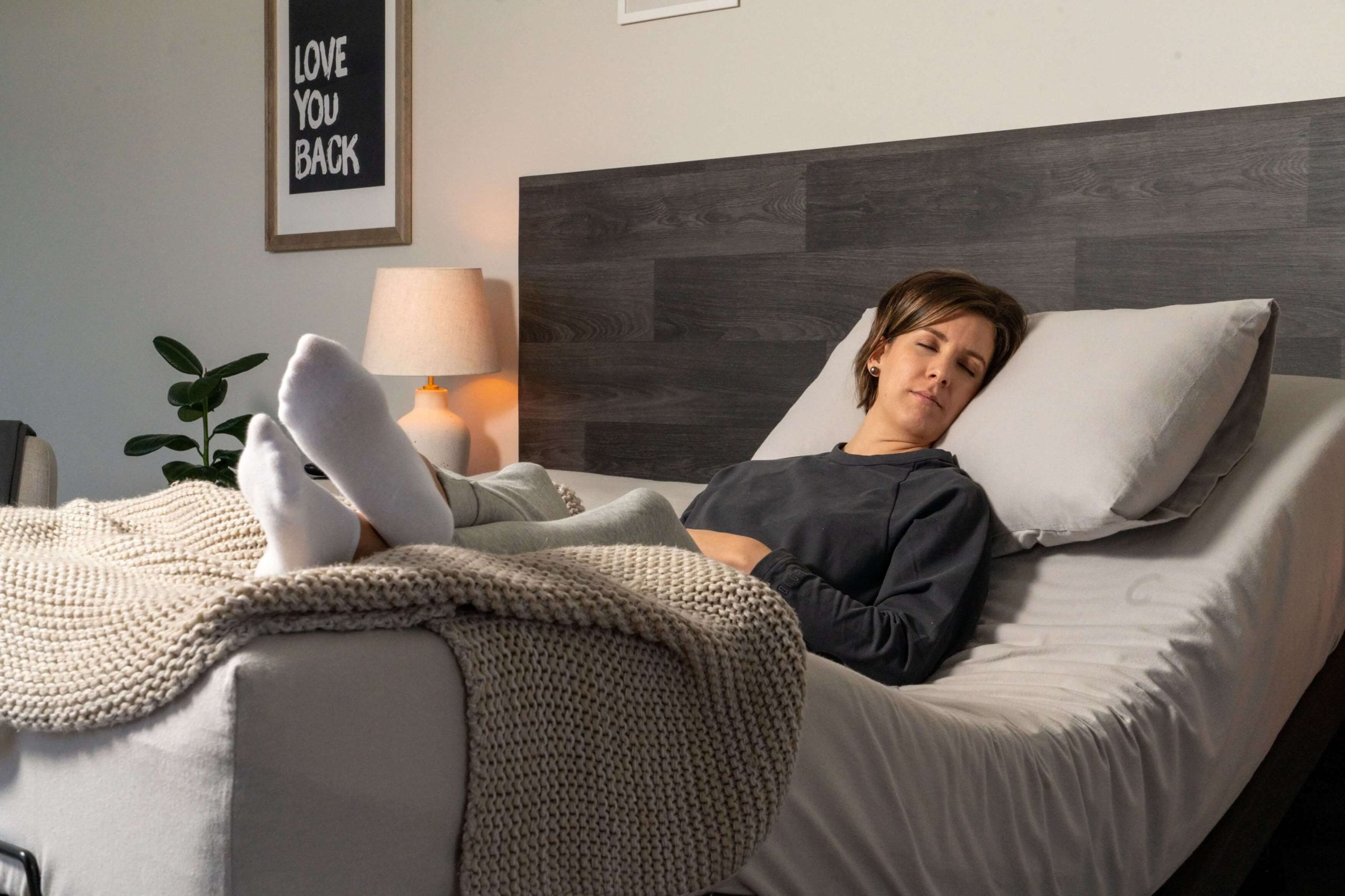
Sleep hygiene is a term that encompasses the habits, practices, and environmental factors that contribute to a good night’s sleep. The way you sleep impacts your overall health, mood, and productivity. Whether you suffer from chronic back pain, snoring, sleep apnea, or simply want to improve your well-being, understanding and practicing good sleep hygiene is crucial. In this article, we’ll pull back the covers on sleep hygiene, share our top tips on how to improve your sleep and take a look at what both good and bad sleep hygiene looks like.
The importance of sleep hygiene
Sleep hygiene refers to the practice of developing behaviours and creating an environment that promotes consistent, quality sleep. It’s the foundation of restful, uninterrupted sleep and can directly influence your mental and physical health. Prioritising good sleep hygiene can lead to better sleep patterns, improved daytime functioning, and a higher overall quality of life.
In today’s fast-paced world, sleep is often compromised with busy schedules, stress, and digital distractions keeping you up. However, maintaining good sleep hygiene is essential for restorative sleep that keeps you feeling refreshed and ready to take on the day from the moment you wake up. Poor sleep hygiene can lead to difficulty falling asleep, frequently waking up throughout the night, and reduced overall sleep quality, which can have far-reaching effects on your health.
Benefits of maintaining good sleep hygiene
Maintaining good sleep hygiene is key to getting deep, restful sleep, which in turn comes with a wide variety of benefits, including:
Improved mood and mental health
Quality sleep and mental health are closely intertwined. When you get enough restorative sleep, your brain has the opportunity to process emotions, which is crucial for maintaining mood stability. Good sleep hygiene can help prevent sleep loss and the potential impacts lack of sleep can have on mental health, such as anxiety and depression. In contrast, poor sleep can negatively impact mental health conditions, making it difficult to manage stress and emotional challenges effectively.
Improved brain function
Sleep is a vital component of cognitive function, affecting everything from attention span to memory consolidation and problem-solving abilities. During sleep, your brain processes and stores information from the day, helping to reinforce learning and memory. Good sleep hygiene enables you to enter and stay in the deeper stages of sleep, where this processing occurs most effectively.
Better physical health
Sleep plays a critical role in maintaining and restoring physical health. It’s during sleep that your body repairs tissues, produces essential hormones, and strengthens the immune system. Good sleep hygiene contributes to these processes, helping to reduce inflammation, lower the risk of chronic diseases like heart disease and diabetes, and improve overall physical well-being.
Quality sleep also supports metabolic health by regulating hunger hormones like ghrelin and leptin, which control appetite and energy balance. This can prevent overeating and support a healthy weight, further contributing to long-term physical health.
Chronic pain management
For people suffering from chronic pain, such as back pain, good sleep hygiene can make a significant difference in pain management and overall comfort. Sleep quality is often disrupted by pain, creating a vicious cycle where poor sleep increases pain sensitivity. A supportive bed and mattress, like Letto’s electric adjustable beds, can alleviate pressure points and provide the necessary spinal alignment, reducing discomfort and improving sleep quality.
By making sure that your sleeping environment is conducive to rest, you can help manage chronic pain more effectively. This not only improves sleep but also can enhance your ability to engage in daily activities with less pain.
Note: We advise that if you are experiencing any serious pain or discomfort to seek medical attention
Reduced risk of sleep disorders
Practising good sleep hygiene can be an effective way to prevent and manage sleep disorders such as insomnia, sleep apnea, and restless leg syndrome. Consistent sleep schedules, a comfortable sleep environment, and healthy pre-sleep habits can all contribute to the regulation of sleep patterns and the prevention of sleep disruptions.
For those living with sleep disorders, good sleep hygiene can also complement medical treatments and improve their effectiveness. By reducing the factors that contribute to sleep problems, you can enjoy more restful sleep and better overall health.
Note: We advise that if you are experiencing any symptoms of any of these disorders to seek medical attention
Top tips for good sleep hygiene

Establishing and maintaining good sleep hygiene involves making intentional changes to your daily routines and sleep environment. These tips can help you cultivate better sleep habits and create an environment that supports restful sleep.
1. Maintain a consistent sleep schedule
One of the most important aspects of good sleep hygiene is maintaining a consistent sleep schedule. Going to bed and waking up at the same time every day, including weekends, helps regulate your body’s internal clock, also known as the circadian rhythm, which you can learn more about in our article on the different stages of sleep. This consistency trains your body to know when it’s time to sleep and wake up, making it easier to fall asleep and stay asleep.
Inconsistencies in your sleep schedule, such as staying up late and sleeping in on weekends, can confuse your circadian rhythm, leading to difficulties falling asleep on Sunday nights and feeling groggy on Monday mornings.
2. Create a relaxing bedtime routine
A relaxing bedtime routine signals to your body that it’s time to wind down and prepare for sleep. This routine might include activities like reading a book, taking a warm bath, or practising mindfulness meditation. These activities can help reduce stress and prepare your mind and body for sleep.
One crucial aspect of a bedtime routine is avoiding screens at least an hour before bed. The blue light emitted by phones, tablets, and computers can interfere with the production of melatonin, the hormone responsible for regulating sleep. By reducing screen time and engaging in calming activities, you can improve your ability to fall asleep quickly and sleep more soundly.
3. Optimise your sleep environment
Your bedroom environment plays a critical role in your ability to sleep well. To create an optimal sleep environment, focus on the comfort, quietness, and darkness of your bedroom. A quality bed, mattress and pillows, like the Letto range, can provide the support and comfort needed for restful sleep. Here are some other things to consider:
- Temperature: Keep your room cool, ideally between 15-19°C, as a cooler environment is generally more conducive to sleep.
- Lighting: Use blackout curtains or a sleep mask to block out light, and consider using a white noise machine or earplugs to drown out disruptive noises.
- Clutter: Keep your bedroom tidy and free of distractions to create a calming atmosphere that promotes relaxation and sleep.
By optimising your sleep environment, you create a space that supports your body’s natural sleep processes, making it easier to fall asleep and stay asleep.
4. Be mindful of what you eat and drink
What you eat and drink, especially in the hours leading up to bedtime, can significantly impact your sleep quality. Avoid heavy meals, spicy foods, caffeine, and alcohol before bedtime, as these can cause indigestion, disrupt sleep, or lead to frequent awakenings during the night.
Instead, opt for a light snack that promotes sleep, such as foods rich in tryptophan (like turkey, bananas, or nuts) or complex carbohydrates (like oatmeal or whole-grain toast). These foods can help increase the production of serotonin and melatonin which regulate sleep.
5. Stay active, but not right before bed
Regular physical activity is a must for good sleep hygiene. Exercise helps you fall asleep faster and enjoy deeper sleep. However, timing is important—exercising too close to bedtime can have the opposite effect by raising your body temperature and stimulating your nervous system, making it harder to fall asleep.
To maximise the sleep benefits of exercise, aim to finish your workout at least three hours before bed. This allows your body time to cool down and relax, making it easier to drift off to sleep when bedtime arrives.
6. Limit naps
Napping can be a helpful way to recharge during the day, but it’s important to approach naps with caution. Long or irregular naps, especially in the late afternoon or evening, can interfere with your nighttime sleep by making it harder to fall asleep at your usual bedtime.
If you feel the need to nap, keep it to an ideal 10 to 20 minutes and try to nap earlier in the day. This can help you stay alert without compromising your ability to sleep at night.
7. Manage stress
Stress is one of the most common barriers to good sleep. When your mind is racing with worries or your body is tense with anxiety, it can be difficult to relax and fall asleep. Managing stress is therefore a key component of sleep hygiene.
Incorporating stress-reduction techniques into your daily routine can help you unwind before bed and improve your sleep. Practices such as yoga, deep breathing exercises, progressive muscle relaxation, or journaling can help calm your mind and body, making it easier to fall asleep and enjoy restful sleep.
8. Consider your light exposure
Light exposure plays a crucial role in regulating your circadian rhythm, which controls your sleep-wake cycle. Exposure to natural light during the day, particularly in the morning, helps keep your circadian rhythm aligned with the day-night cycle, making it easier to fall asleep at night.
In the evening, dim the lights in your home to signal to your body that it’s time to wind down. Avoid bright lights and blue light exposure from screens, as these can trick your brain into thinking it’s still daytime, making it harder to fall asleep.

The role of naps in sleep hygiene
Napping is a double-edged sword when it comes to sleep hygiene. While a short nap can help you recharge and improve mood and performance, long or irregular naps can interfere with your nighttime sleep.
Are naps good or bad?
The answer depends on several factors:
- Duration: Short naps of 10-20 minutes can be refreshing and don’t usually affect nighttime sleep. However, longer naps, especially those lasting more than 30 minutes, can lead to grogginess and disrupt your sleep at night.
- Timing: Napping earlier in the day is less likely to interfere with nighttime sleep. Napping too late in the afternoon or evening can make it harder to fall asleep at night.
- Sleep debt: If you’re sleep-deprived, a nap might be necessary to help you get through the day. Just be mindful of how long and when you nap.
Tips for napping
- Keep it short: Limit naps to 10-20 minutes to avoid sleep inertia and nighttime sleep disruption.
- Nap early: Try to nap in the early afternoon to prevent it from interfering with your nighttime sleep.
- Create a nap-friendly environment: Just like nighttime sleep, your nap environment should be conducive to rest—quiet, dark, and comfortable.
How Letto products support good sleep hygiene
At Letto, we understand that quality sleep starts with a comfortable and supportive sleep environment. Our Italian-designed, OEKO-TEX® Certified products are crafted with environmentally friendly materials, ensuring you sleep in comfort and style. Whether you suffer from chronic back pain, snoring, or sleep apnea, our products are designed to support your sleep hygiene by providing the optimal environment for rest.
Mattresses for every need
Our mattresses are tailored to provide the perfect balance of support and comfort. Whether you need a firm mattress to alleviate back pain or a softer option for a more luxurious feel, Letto has the perfect solution. Our mattresses are designed to reduce pressure points, support spinal alignment, and minimise movement disturbances, giving you a sound sleep through the night.
Adjustable beds
Our range of adjustable beds are ideal for those with specific sleep needs, such as individuals with sleep apnea or chronic pain. These beds allow you to adjust the position to your preference, improving circulation, reducing snoring, and providing relief for back pain.
Eco-friendly and certified
All our products are OEKO-TEX® Certified, meaning they are free from harmful substances and environmentally friendly. This certification ensures that our products contribute to a healthy sleep environment, which is a crucial aspect of sleep hygiene.
Put bad sleep hygiene to bed
At Letto, we are committed to supporting your journey to better sleep with our Italian-designed, environmentally friendly products. No matter what you’re dealing with, our beds, mattresses, linen sets and pillows are designed to meet your needs and help you maintain optimal sleep hygiene.
Invest in your sleep today with Letto and experience the difference that good sleep hygiene can make in your life. For any further information or questions, contact us online.
